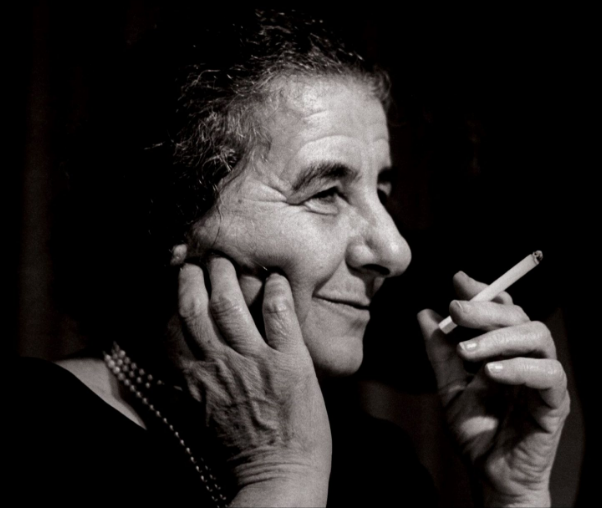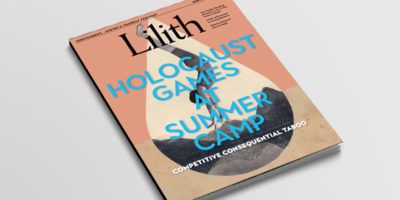
When Golda Meir Ran for Mayor of Tel Aviv, Won the Most Votes, and Lost the Election
What Golda compromised when she ran for mayor of Tel Aviv—and the consequences for Israel.
[In 1955,] Golda Meyerson ran for mayor of Tel Aviv. She let everyone know that she did this for the party. She had no interest in giving up her job as labor minister, she said, but [Prime Minister David] Ben-Gurion wanted someone from Mapai [his party] to gain control of this key post, and he chose her. …But getting the job was not so easy, even for the popular Mrs. Meyerson.
Chaim Levanon, the current mayor, belonged to the General Zionists Party. To wrest control of the city from that party, Golda and her comrades turned to [the parties] Mapam, Ahdut Ha’avoda (which had split from Mapam in 1954), and the small but influential religious parties. In exchange for the religious parties’ support, Ben-Gurion had reached agreements with them on matters of religion in the state even before the state officially came into being. Under those agreements, the Jewish Sabbath became the legal day of rest in the land and kosher food the fare served at every state eating facility. The most controversial agreement concerned the Orthodox chief rabbinate’s control over Jewish marriage and divorce.
Though Golda accepted the arrangement with the religious groups as a political necessity, she made no bones about her own secular attitude toward religious rules. After she returned from Moscow, the Orthodox Knesset member Benjamin Mintz invited her to the Great Synagogue in Tel Aviv, knowing that she rarely, if ever, attended services except for official purposes. “Do you go to synagogue only in Moscow?” he asked jokingly. Without missing a beat, she replied, “In Moscow I wanted to be with Jews, so I agreed to sit even in the segregated women’s section upstairs, but here in Tel Aviv, I am prepared to go tomorrow and every Sabbath if there will be equality and you arrange a seat for me downstairs in the sanctuary among the men!” That, she knew, would not happen in an Orthodox synagogue.
More seriously, she openly resented the authority the rabbis held over marital issues. Time and again, she informed her colleagues that she had never in her public life felt as ashamed of anything as she had when she voted to legalize the Orthodox rabbinate’s monopoly over marriage and divorce. For a moment, she had even considered withdrawing from the Knesset to avoid raising her hand for the law. She didn’t hold back about other religious rulings either. “I have never eaten pork in Israel,” she once said, implying that she might have eaten it elsewhere. But should breeding pigs and selling pork be banned so that nobody could eat it? Such laws “begin with pork and reach into all sorts of other things. And what a person does in his private life is not anyone’s business, not the business of one single rabbi.”
Those antireligious statements notwithstanding, Golda joined her Mapai comrades in coalition talks with the religious parties. At the same time, she campaigned hard in Tel Aviv for the party and her candidacy. On the go nonstop from one neighborhood to the next, she gave speeches, made promises, and directed special appeals to women to vote for her party and clean up the city, whose dirty streets and poor hygiene endangered children. When the nationwide elections were held on July 26, 1955, Mapai remained the largest faction, but it lost seats in the 120-member Knesset, dropping from 45 to 40. In Tel Aviv, the party won 57,400 out of 188,822 votes cast, making it seem likely that Golda would become the city’s next mayor.
“Dear Golda—or should I call you ‘Madame Mayor’?” [Henry] Montor wrote on July 30. The title was premature. Mayors were not elected directly in those years, and although Mapai won the most votes, it did not get a majority on the Tel Aviv city council. As negotiations for the religious parties’ support on the council heated up, their leaders spread the word that they would not elect a woman as Tel Aviv’s mayor, regardless of how much pressure they came under. On the evening of September 8, after almost two months of again running herself ragged electioneering (and landing in the hospital for several days, exhausted), Golda sat in the front row of the city council auditorium looking “sad and emotional.” The vote had been taken: sixteen hands shot up for Chaim Levanon; fourteen were raised for Golda Meyerson. She had lost the election. Mapai had lost. The two decisive votes had been cast by Hapoel Hamizrachi, the religious labor party.
With almost sixty thousand popular votes, Golda had to relinquish her dreams of victory because of a minority religious vote. “You have undermined the elementary principles of democracy,” she accused her opponents in her concession speech. She spoke without a text, in measured tones, but her anger burned through. As a labor party, Hapoel Hamizrachi should have voted with Mapai, its secular counterpart. Yet “you were not ashamed…to exploit the fact that a woman was put forward as a candidate.” Women had participated in every aspect of building the Jewish state, she continued, but through their actions the religious parties had declared that women do not have equal rights in Israel. “If there is anyone who causes religious hatred among the young, the workers, and the little children,” she spat out, “it is the religious parties.”
She had suffered her first major political defeat. Undoubtedly, her earlier proclamations against religion had not helped the situation, but her gender lay at the core of the defeat. When she insisted years later that in her political climb men had never “put obstacles in my way,” she willfully downplayed this painful episode in her life. Despite her disclaimers that she never wanted the mayoral post, losing it hurt badly. She resumed her position as labor minister and took her place in the cabinet again. After much haggling, Mapai formed a coalition government on the national level that once more included the religious parties.
About two months after losing the Tel Aviv race, Golda sat at a special late night meeting of the Mapai political committee. Party members from the Women Workers’ Council had come to discuss their forthcoming participation in a nationwide conference on women’s position in the state. They despised rabbinic control over women’s lives in Israel, particularly its jurisdiction over marital issues. Should they join with women from other political parties in demanding a change in the law? Joseph Sprinzak, speaker of the Knesset, suggested that this was a woman’s matter, not one for the entire political committee to judge. Golda disagreed. “If the law is good for the women it is also good for Sprinzak; if it is bad for the women it is also bad for Sprinzak,” she rebuked him. They had not two parties, one for women and one for men, but a single party whose concerns affected everybody. She made it eminently clear, as she had stated many times before, that she, too, profoundly resented the rabbinic grip on marriage and divorce.
But there was something the women needed to think about. If they wanted to call attention to the many negative aspects of the current marital laws, fine, she said. If, however, they wished to demand changes in the law, that would entail something more. Mapai members would have to go to the cabinet and call for the law to be altered. With that, Mapai’s fragile coalition with the religious parties would fall apart, threatening the labor party’s dominance in the government. After a long discussion in the committee, the women agreed to voice strong complaints against the rabbinate but not to insist on immediate changes in the law.
Ever political, Golda had put her rage at the religious bloc behind her for the benefit of the party. She also put the welfare of the party ahead of the issues she and the women cared about greatly.
Francine Klagsbrun is author of more than a dozen books, including Lioness: Golda Meir and the Nation of Israel.
Copyright © 2017 by Francine Klagsbrun. All rights reserved. No part of this excerpt may be reproduced or reprinted without permission in writing from the publisher.



